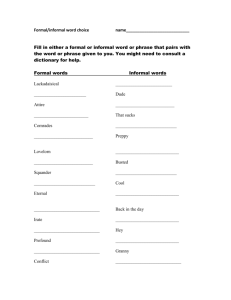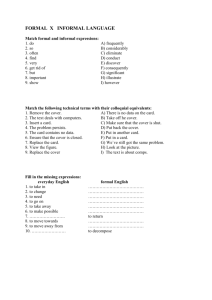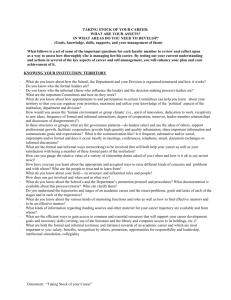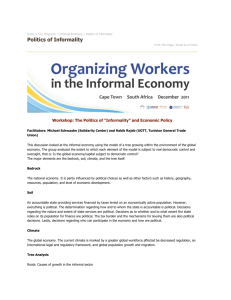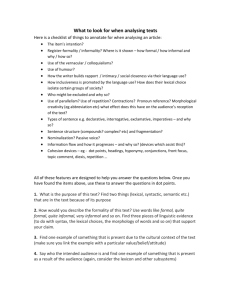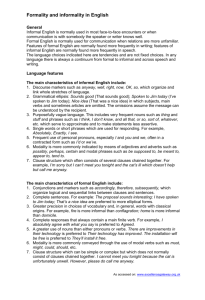PED-375 - Harvard Kennedy School
advertisement
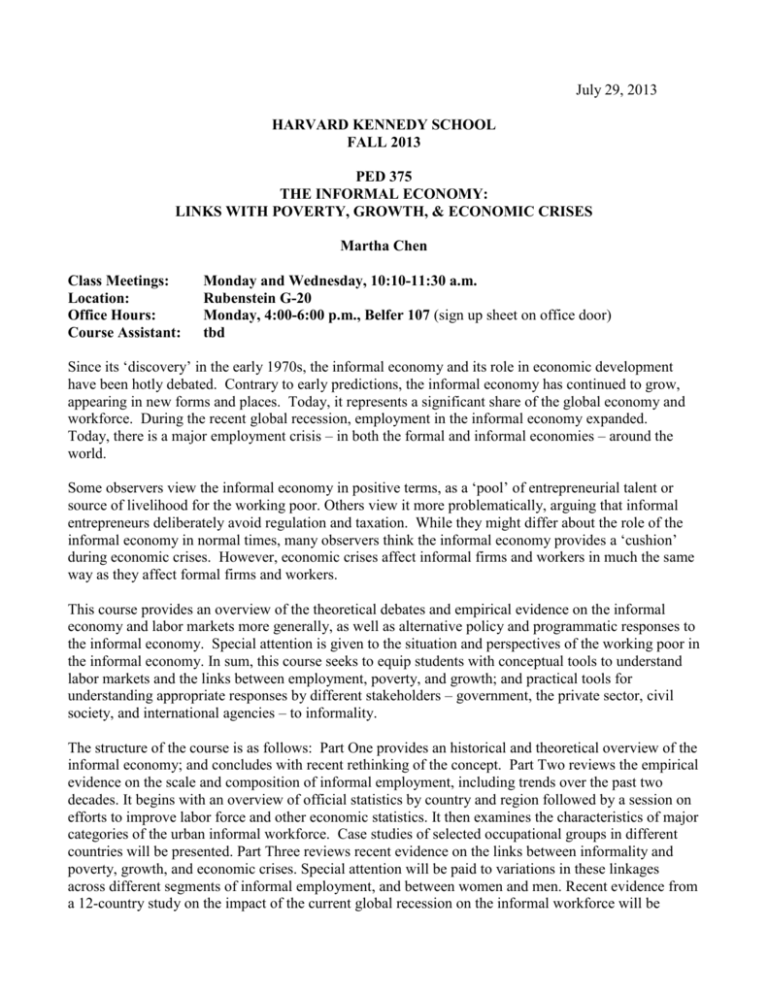
July 29, 2013 HARVARD KENNEDY SCHOOL FALL 2013 PED 375 THE INFORMAL ECONOMY: LINKS WITH POVERTY, GROWTH, & ECONOMIC CRISES Martha Chen Class Meetings: Location: Office Hours: Course Assistant: Monday and Wednesday, 10:10-11:30 a.m. Rubenstein G-20 Monday, 4:00-6:00 p.m., Belfer 107 (sign up sheet on office door) tbd Since its ‘discovery’ in the early 1970s, the informal economy and its role in economic development have been hotly debated. Contrary to early predictions, the informal economy has continued to grow, appearing in new forms and places. Today, it represents a significant share of the global economy and workforce. During the recent global recession, employment in the informal economy expanded. Today, there is a major employment crisis – in both the formal and informal economies – around the world. Some observers view the informal economy in positive terms, as a ‘pool’ of entrepreneurial talent or source of livelihood for the working poor. Others view it more problematically, arguing that informal entrepreneurs deliberately avoid regulation and taxation. While they might differ about the role of the informal economy in normal times, many observers think the informal economy provides a ‘cushion’ during economic crises. However, economic crises affect informal firms and workers in much the same way as they affect formal firms and workers. This course provides an overview of the theoretical debates and empirical evidence on the informal economy and labor markets more generally, as well as alternative policy and programmatic responses to the informal economy. Special attention is given to the situation and perspectives of the working poor in the informal economy. In sum, this course seeks to equip students with conceptual tools to understand labor markets and the links between employment, poverty, and growth; and practical tools for understanding appropriate responses by different stakeholders – government, the private sector, civil society, and international agencies – to informality. The structure of the course is as follows: Part One provides an historical and theoretical overview of the informal economy; and concludes with recent rethinking of the concept. Part Two reviews the empirical evidence on the scale and composition of informal employment, including trends over the past two decades. It begins with an overview of official statistics by country and region followed by a session on efforts to improve labor force and other economic statistics. It then examines the characteristics of major categories of the urban informal workforce. Case studies of selected occupational groups in different countries will be presented. Part Three reviews recent evidence on the links between informality and poverty, growth, and economic crises. Special attention will be paid to variations in these linkages across different segments of informal employment, and between women and men. Recent evidence from a 12-country study on the impact of the current global recession on the informal workforce will be 2 presented. Part Four explores different policy and programmatic responses to informality. The policy sessions begin with a review of three alternative policy approaches to informality – regulation, protection, and promotion – and conclude with discussions of urban planning/regulations and economic policies. The programmatic session focuses on four fields of practice: micro-finance, micro-enterprise development, fair trade, and ethical trade. Part Five provides students an opportunity to observe and interview informal workers in the Boston area, make presentations on what they observed and heard, and draw out the policy implications of their findings. The course concludes with a session on the growing international movement of organizations of informal workers and a final discussion on the future of the informal economy. There are no prerequisites for the course. However, students with a background in international development and/or development economics are preferred. Students will be expected to write two short papers and make one group presentation (based on the field exercise). There will be a final paper in lieu of a final examination. Required readings will be accessible through the online course page and will be available on reserve at the HKS Library. Class will not be held on October 14 (Columbus Day), November 11 (Veteran’s Day), and November 27 (Thanksgiving Break). Students will participate in a field exercise the week of October 28 rather than attend class on October 28 and 30. INTRODUCTION (Sept. 6) A. What Is the Informal Economy? B. Why Study the Informal Economy? C. Overview of Course I. HISTORICAL PERSPECTIVES (Sept. 9) A. Economic Development and Employment B. Informal Economy Required Readings: Fields, G. 2004. “A Guide to Multisector Labor Market Models.” Prepared for the World Bank Labor Market Conference. Available at: http://siteresources.worldbank.org/INTLM/Resources/3900411103750362599/Fields_MultisectorLMGuide.pdf Hart, K. 1973. “Informal Income Opportunities and Urban Employment in Ghana”, The Journal of Modern African Studies, Vol. 11, No. 1, pp. 61-89. Lewis, W.A. 1954. "Economic Development with Unlimited Supplies of Labour”, Manchester School of Economic and Social Studies, 23(2), pp. 139-91. Singer, H. W. "Dualism Revisited: A New Approach to the Problems of Dual Society in Developing Countries", in Journal of Development Studies, October 1970, pp. 60-75. Available at: http://ezpprod1.hul.harvard.edu/login?url=http://search.ebscohost.com/login.aspx?direct=true&db=aph&AN=769 2531&site=ehost-live&scope=site (click on PDF) 3 II. THEORY AND DEBATES (Sept. 11) A. Four Main Theories 1. Dualist: ILO World Employment Mission 2. Structuralist: Castells and Portes 3. Legalist: de Soto 4. Voluntarist : Maloney B. Differences in Perspective: when reading the required readings, students should consider the differences in perspective of each of these schools regarding the following aspects of informality: 1. Definition and Composition 2. Characteristics 3. Causes 4. Links with Formal Economy 5. Links with Formal Regulatory Environment Required Readings: Castells, M. and A. Portes. 1989. “World Underneath: The Origins, Dynamics and Effects of the Informal Economy” in Portes, A. et al., eds., The Informal Economy: Studies in Advanced and Less Developed Countries, Baltimore: John Hopkins University Press, pp. 11-37. International Labour Office. 1972. Employment, Incomes and Equality: A Strategy for Increasing Productive Employment in Kenya, Geneva, Switzerland: ILO, pp. 1-8, 51-57, 76-77. Available at: http://www.ilo.org/public/libdoc/ilo/1972/72B09_608_engl.pdf Maloney, W. F. 2004. “Informality Revisited”, World Development, Vol. 32, No. 7, pp.1159-1178. Available at: http://dx.doi.org.ezp-prod1.hul.harvard.edu/10.1016/j.worlddev.2004.01.008 de Soto, H. 1989. The Other Path: The Invisible Revolution in the Third World. pp. 3-15, 131-187. Assignment # 1 Students will write a short analytical paper comparing two theories of the informal sector. First, select two of the four main schools of thought on the informal sector. Then, compare what the two schools have to say about the composition, characteristics, and causes of the informal sector, and the links between the informal sector, formal enterprises, and the formal regulatory environment. At the end, on a separate sheet, prepare a matrix that summarizes the key aspects of your comparison. This paper should not exceed 1000 words, and will be due on September 18. III. RECENT RETHINKING (Sept. 16) A. International Labour Organization B. World Bank C. WIEGO Network Required Readings: Chen, M. 2012. “The Informal Economy: Definitions, Theories, & Policies”. WIEGO Working Paper # 1. Cambridge, MA: WIEGO. Available at: http://wiego.org/sites/wiego.org/files/publications/files/Chen_WIEGO_WP1.pdf 4 International Labour Office. 2002. Decent Work and the Informal Economy. Geneva, Switzerland: International Labour Conference, 90th. Session, Report VI, pp. 1-9. Available at: http://www.ilo.org/public/english/standards/relm/ilc/ilc90/pdf/rep-vi.pdf Perry, G. et al. 2007. Informality: Exit and Exclusion. Washington, D.C.: The World Bank, pp. 1-20. Available at: http://wwwwds.worldbank.org/external/default/WDSContentServer/WDSP/IB/2007/06/19/000090341_2007061914 3652/Rendered/PDF/400080Informal101OFFICIAL0USE0ONLY1.pdf IV. IMPROVING STATISTICS (Sept. 18)* *First assignment due in class. Guest Lecturer: Joann Vanek, Director of WIEGO Statistics Program and former head of Social Statistics, UN Statistical Division Required Reading: Hussmanns, R. 2007. “Measurement of Employment, Unemployment, and Underemployment: Current International Standards and Issues in Their Application” in Bulletin of Labour Statistics. Available at: http://www.ilo.org/wcmsp5/groups/public/---dgreports/---integration/--stat/documents/publication/wcms_088394.pdf Hussmanns, R. 2004. “Measuring the Informal Economy: From Employment in the Informal Sector to Informal Employment”. Working Paper 53. Geneva, Switzerland: ILO Policy Integration Department, Bureau of Statistics. Available at: http://www.ilo.org/wcmsp5/groups/public/--dgreports/---integration/documents/publication/wcms_079142.pdf Recommended Readings: students should read these papers to prepare for Assignment # 2. ILO Bureau of Statistics with the Department for Statistics and Sociology of the Republic of Moldova. 2005. “Employment in the Informal Economy in the Republic of Moldova”. Working Paper 41. Available at: http://www.ilo.org/wcmsp5/groups/public/---dgreports/--integration/documents/publication/wcms_079145.pdf Heintz, J. 2009. “Estimating informal employment in Serbia, Kazakhstan, and the Former Yugoslavian Republic of Macedonia: Definitions, recommendations and applications.” Report prepared for a joint project of the UNECE and ILO (Geneva). Available on reserve at the HKS Library. V. EMPIRICAL REALITY (Sept. 23) A. Global Picture B. Regional Patterns C. Main Categories D. Statistical Limitations Required Readings: Chen, M. et al. 2005. Progress of the World’s Women 2005: Women, Work, and Poverty. New York: UNIFEM, pp. 36-57. Available at: http://www.un-ngls.org/orf/women-2005.pdf 5 Vanek, J. et al. 2012. Women and Men in the Informal Economy: A Statistical Picture. Geneva, Switzerland: ILO and WIEGO. To be circulated later. Perry, G. et al. 2007. Informality: Exit and Exclusion. Washington, D.C.: World Bank, pp. 21-42. Available at: http://wwwwds.worldbank.org/external/default/WDSContentServer/WDSP/IB/2007/06/19/000090341_2007061914 3652/Rendered/PDF/400080Informal101OFFICIAL0USE0ONLY1.pdf Assignment # 2 Students should choose one country as their particular focus for the course. Using statistics from national and international sources, prepare a profile of the labor force in your selected country. Use the most recent data available on the total labor force, including both formal and informal employment. To the degree possible, disaggregate the data by urban and rural areas, by industry or sector, by employment status, and by sex. The purpose of the labor force profile is to be clear about a) the different categories of the labor force in your selected country and b) what available statistics tell us – and don’t tell us - about the labor force in your country. Provide brief notes on the sources of the data you present. Please note that, for the final paper, you will be asked to write a policy brief on the same country. The labor force profile should be 1000 words in length, typed, and double-spaced, and will be due on October 9. VI. THE INFORMAL WORKFORCE (Sept. 25) A. Major Groups: students should chose one of the following occupational groups and read the 2-3 required readings related to that group and be prepared to discuss what they learn about the group. 1. Domestic Workers 2. Home-Based Workers 3. Street Vendors 3. Waste Pickers B. Key Variables: when reading about the group they selected, students should consider whether and how the following variables help define the work arrangements of that group. 1. Place of Work 2. Employment Status 3. Forward and Backward Linkages Required Readings: students should a) read the 2-3 readings below related to the occupational group that they have chosen from A above and b) also read the occupational page for this group on the WIEGO website: http://wiego.org/informal-economy/occupational-groups. Benton, L.1989. “Homework and Industrial Development: Gender Roles and Restructuring in the Spanish Shoe Industry”, World Development, Vol. 17, No. 2, pp. 255-266. Available at: http://dx.doi.org.ezp-prod1.hul.harvard.edu/10.1016/0305-750X(89)90249-0 (click on PDF) Birkbeck, C. 1979. “Garbage, Industry, and the ‘Vultures’ of Cali, Colombia” in Bromley, R. and C. Gerry, eds., Casual Work and Poverty in Third World Cities. New York: John Wiley and Sons, pp. 161183. Bromley, R. 1978. “Organization, Regulation and Exploitation in the So-Called 'Urban Informal Sector': The Street Traders of Cali”, World Development, Vol. 6, No. 9/10, Sept-Oct, p. 1161-71. Available at: http://dx.doi.org.ezp-prod1.hul.harvard.edu/10.1016/0305-750X(78)90070-0 (click on PDF) 6 Chen, M. 2010. “Recognizing and Protecting Domestic Workers: Conceptual, Measurement, and Regulatory Challenges”. Chapter for Special Issue of Canadian Journal of Women and Law on “Regulating Decent Work for Domestic Workers”. Lund, F. and J. Nicholson, eds. 2004. Chains of Production, Ladders of Protection. Washington, D.C.: World Bank. Available at: http://wwwwds.worldbank.org/servlet/WDSContentServer/WDSP/IB/2004/06/23/000160016_20040623105223/Re ndered/PDF/28116.pdf Roever, S. 2006. “Street Trade in Latin America: Demographic Trends, Legal Issues, and Vending Organizations in Six Cities”. Regional Review for WIEGO Urban Policies Programme. Cambridge, MA: WIEGO. Available at: http://wiego.org/sites/wiego.org/files/publications/files/Roever-Street-Trade-Latin-Amer.pdf Samson, M., ed. 2009. Refusing to be Cast Aside: Waste Pickers Organising Around the World. WIEGO On-Line Publication. Available at: http://wiego.org/sites/wiego.org/files/publications/files/Samson-Refusing-to-be-Cast-AsideWastepickers-Wiego-publication-English.pdf Skinner, C. 2008. Street Trade in Africa: A Review. WIEGO Working Paper (Urban Policies) No.5. Available at: http://wiego.org/sites/wiego.org/files/publications/files/Skinner_WIEGO_WP5.pdf VII. POVERTY AND GROWTH LINKAGES (Sept. 30) A. Informality and Poverty B. Informality and Growth Required Readings: Chen, M. et al. 2005. Progress of the World’s Women 2005: Women, Work, and Poverty. New York: UNIFEM, pp. 37-73. Available at: http://www.un-ngls.org/orf/women-2005.pdf Galli, R. and D. Kucera. 2003. “Informal Employment in Latin America: Movements Over Business Cycles and the Effects on Worker Rights”, Institute of International Labour Studies Discussion Paper, No. 145. Geneva: ILO. Available at: http://www.ilo.org/dyn/dwresources/docs/287/F73675047/Galli%20and%20Kucera.pdf Heintz, J. and R. Pollin. "Informalization, Economic Growth and the Challenge of Creating Viable Labor Standards in Developing Countries." Available at: http://www.peri.umass.edu/fileadmin/pdf/working_papers/working_papers_51-100/WP60.pdf Loayza, N., and J. Rigolini. 2006. “Informality Trends and Cycles” Policy Research Working Paper 4078. Washington, D.C.: World Bank. Available at: http://wwwwds.worldbank.org/external/default/WDSContentServer/IW3P/IB/2006/12/05/000016406_2006120515 3005/Rendered/PDF/wps4078.pdf 7 VIII. ECONOMIC CRISES AND INFORMALITY (Oct. 2) A. Impact of Crises: Theory and Reality B. Responses to Crises: Private and Public Required Readings: Horn, Zoe Elena. 2009. No Cushion to Fall Back On: The Global Economic Crisis and Informal Workers. WIEGO and Inclusive Cities. Available at: http://www.inclusivecities.org/pdfs/GEC_Study.pdf Horn, Zoe Elena. 2011. Coping with Crises: Lingering Recession, Rising Inflation, and the Informal Workforce. WIEGO and Inclusive Cities. Available at: http://wiego.org/sites/wiego.org/files/publications/files/Horn-Global-Economic-Crisis-2_0.pdf IX. ECONOMIC POLICIES (Oct. 7) Guest Lecturer: James Heintz, Research Professor at University of Massachusetts/Amherst Required Readings: Heintz, J. 2009. “Employment, Poverty, and Inclusive Development in Africa: Policy Choices in the Context of Widespread Informality," in Padayachee, V. ed. The Political Economy of Africa. Amherst. Heintz, J. 2008. “Revisiting Labour Markets: Implications for Macroeconomics and Social Protection” in Kabeer, Cook, and Heintz, eds., IDS Bulletin, Vol. 39, No. 2, Brighton, UK: Institute of Development Studies, pp. 11-17 X: URBAN PLANNING & POLICIES (Oct. 9)* *Second assignment due in class Guest Lecturers: Sally Roever and Lucia Fernandez Required Readings: Bromley, R. 2000. ‘Street Vending and Public Policy: A Global Review’, International Journal of Sociology and Social Policy. Vol. 20, Issue 1/2. Crossa, V. 2009. "Resisting the Entrepreneurial City: Street Vendors' Struggle in Mexico City's Historic Center." International Journal of Urban and Regional Research Vol. 33.1 (March): 43-63. Available at: http://wiego.org/sites/wiego.org/files/publications/files/Crossa%20_Resisting_Entrepreneurial_City_200 9.pdf Öz, Özlem and Eder, Mine. 2012. “Rendering Istanbul’s Periodic Bazaars Invisible: Reflections on Urban Transformation and Contested Space.” International Journal of Urban and Regional Research v. 36, no. 2 (March): 297-314. Dobson, R., C. Skinner, and J. Nicholson. 2009. Working in Warwick: Including Street Traders in Urban Plans, pp. 43-61. Durban, South Africa: University of KwaZulu Natal and WIEGO. Available at: http://wiego.org/sites/wiego.org/files/publications/files/Working_in_Warwick_Ch_2.pdf 8 Lund, F. and C, Skinner. 2004. “Integrating the Informal Economy in Urban Planning and Governance: A Case Study of the Process of Policy Development in Durban, South Africa”. International Development Planning Review, Vol. 26, No.4, 2004. Available at: http://liverpool.metapress.com/content/6055652532574441/fulltext.pdf Roever, S. 2006. “Enforcement and compliance in Lima’s street markets: The origins and consequences of policy incoherence towards informal traders,” in B. Guha-Khasnobis, R. Kanbur, & E. Ostrom, eds. Linking the Formal and Informal Economy: Concepts and Policies. New York: Oxford University Press, pp. 246-262. Available at: http://nrs.harvard.edu/urn3:hul.ebookbatch.OXSCH_batch:osouk0199204764 (Select chapter title in list) Spodek, Howard. 2012. "Raju and the Radisson." Manuscript. Available at: http://wiego.org/sites/wiego.org/files/resources/files/Spodek_Raju_and_the_Radisson.pdf XI. POLICY RESPONSE # 1: REGULATION (Oct. 16) A. Framework for Policy Analysis 1. policy stance 2. functional areas of policy 3. policy process B. The Formalization Debate C. Regulation: whether and how to regulate… 1. informal enterprises 2. informal jobs/employment relations Required Readings: Chen, M. 2006. “Rethinking the Informal Economy: Linkages with the Formal Economy and the Formal Regulatory Environment” in Linking the Formal and Informal Economy, edited by Guha-Khasnobis, B., R. Kanbur and E. London: Oxford University Press, pp. 75-92. Commission on Legal Empowerment of the Poor. 2008. Making the Law Work for Everyone: Volume II Working Group Reports, pp.147-165, 200-202, 221, 244-253. Available at: http://www.undp.org/content/dam/aplaws/publication/en/publications/democratic-governance/dgpublications-for-website/making-the-law-work-for-everyone---vol-ii-/making_the_law_work_II.pdf Kucera, D. and L. Roncolato. 2008. “Informal Employment: Two Contested Policy Issues” in International Labour Review, Vol. 147, No. 4. Available at: http://www.ilo.org/public/english/revue/download/pdf/s2_kucera_roncolato.pdf Perry, G. et al. 2007. Informality: Exit and Exclusion. Washington, D.C.: World Bank, pp. 175-178. Available at: http://wwwwds.worldbank.org/external/default/WDSContentServer/WDSP/IB/2007/06/19/000090341_2007061914 3652/Rendered/PDF/400080Informal101OFFICIAL0USE0ONLY1.pdf XII. POLICY RESPONSE # 2: PROTECTION (Oct. 21) A. Social Protection B. Legal Protection Required Readings: 9 Commission on Legal Empowerment of the Poor. 2008. Making the Law Work for Everyone: Volume I Report of the Commission, pp. 43-89. Available at: http://www.undp.org/content/dam/aplaws/publication/en/publications/democratic-governance/dgpublications-for-website/making-the-law-work-for-everyone---voli/Making_the_Law_Work_for_Everyone.pdf Levy, Santiago. 2008. Good Intentions, Bad Outcomes: Social Policy, Informality, and Economic Growth in Mexico, pp. 253-291. Washington, D.C.: Brookings Institution Press. Perry, G. et al. 2007. Informality: Exit and Exclusion. Washington, D.C.: World Bank, pp. 179-248. Available at: http://wwwwds.worldbank.org/external/default/WDSContentServer/WDSP/IB/2007/06/19/000090341_2007061914 3652/Rendered/PDF/400080Informal101OFFICIAL0USE0ONLY1.pdf WIEGO. Law and Informality website: Available at: http://wiego.org/law XIII: POLICY RESPONSE # 3: PROMOTION (Oct. 23) A. Promotion of Informal Enterprises B. Promotion of Informal Workers Required Readings: Chen, M. et al. 2005. Progress of the World’s Women 2005: Women, Work, and Poverty. New York: UNIFEM, pp. 86-104. Available at: http://www.un-ngls.org/women-2005.pdf National Commission for Enterprises in the Unorganised Sector. 2007. Report on Conditions of Work and Promotion of Livelihoods in the Unorganised Sector. New Delhi: National Commission for Enterprises in the Unorganised Sector, pp. 172-224. Available at: http://www.prsindia.org/uploads/media/Unorganised%20Sector/bill150_20071123150_Condition_of_w orkers_sep_2007.pdf XIV. INFORMAL ECONOMY IN BOSTON: FIELD EXERCISE (Week of Oct. 28) Details of the field exercise and group presentation will be presented in early November. XV. INFORMAL ECONOMY IN BOSTON: PRESENTATIONS (Nov. 4 and 6) *The third assignment – a group presentation – will be made in class on Nov. 4 and 6. XVI. PROGRAMMATIC RESPONSES (Nov. 13) A. Micro-Finance B. Business Development Services C. Fair Trade D. Ethical Trade Required Readings: Related Websites: Please scan the following websites to get a sense of current practice and debates in the fields of micro-finance, micro-enterprise development, fair trade, and ethical trade. If you have worked in either or both of these fields of practice, please be prepared to say a few words, based on your experience, on what you think are the greatest past accomplishments and the greatest future challenges in your field/s of practice. 10 http://www.microfinancegateway.org/p/site/m/ http://www.cgap.org/p/site/c/ http://www.enterprise-development.org/ http://www.ethicaltrade.org/ http://www.fairtradefederation.org/ XVII. INTERNATIONAL SOCIAL MOVEMENT (Nov. 18) A. Local Organizing and National Advocacy B. International Organizing and Advocacy Required Reading: Batliwala, S. “Grassroots Movements as Transnational Actors: Implications for Global Civil Society”, Voluntas, Vol. 13, pp. 393-409. Bhatt, E. 2006. We Are Poor But So Many. New York: Oxford University Press. pp. 23-46, 211-219. Related Websites: Please scan the following websites to get a sense of a) the range of interventions that SEWA undertakes with and for its members; b) what StreetNet International is doing with and for its affiliates; c) the initiatives of the Inclusive Cities project for the urban working poor; and c) the role of WIEGO in the international movement of informal workers. www.sewa.org www.streetnet.org.za/ www.inclusivecities.org http://wiego.org/wiego/core-programmes/organization-representation Final Exercise You are the head of a National Task Force appointed by the President or Prime Minister of your selected country to formulate a national strategy for generating productive employment and decent work for those who work in the informal economy in your country, including appropriate roles and responsibilities of different stakeholders (national and local government, private sector companies, nongovernmental organizations, and workers’ organizations). After reflecting on the readings and discussions over the past semester, write a memo to the President or Prime Minister that recommends, with supporting arguments, an appropriate policy and institutional response to informal employment as a key pathway to reducing poverty. Your memo should reflect a concrete understanding of the composition of the informal economy in your selected country (from Assignment # 2) and of the policy options presented and discussed during the course. Your memo should be 1500 words in length, typed, and double-spaced, and will be due on December 4th. XVIII. INFORMAL ECONOMY IN DEVELOPED COUNTRIES (Nov. 20) Guest Lecturer: Francoise Carré, Research Director, Center for Social Policy at University of Massachusetts, Boston and WIEGO Research Coordinator Required Readings: Bernhardt, A., Spiller, M., & Polson, D. 2013. “All work and no pay: Violations of employment and labor laws in Chicago, Los Angeles and New York City,” Social Forces, 91(3): 725-46. 11 Carré, F. et al. 2000. “Nonstandard Work: The Nature and Challenges of Changing Employment Arrangements,” in Carré, Ferber, Golden, and Herzenberg, eds. Nonstandard Work Arrangements and the Changing Labor Market. Champaign, Ill and Ithaca, NY: Industrial Relations Research Association/Cornell University Press, pp .1-20. Carre, F. and J. Heintz. 2009. “Issues in Developing a Common Framework on Informal Employment,” 2009. WIEGO Working Paper. Available at: http://wiego.org/sites/wiego.org/files/publications/files/Carre_and_Heintz_Common_Framework.pdf XIX. THE FUTURE OF INFORMALITY Nov. 25)* *Final Assignment Due on December 4th.

